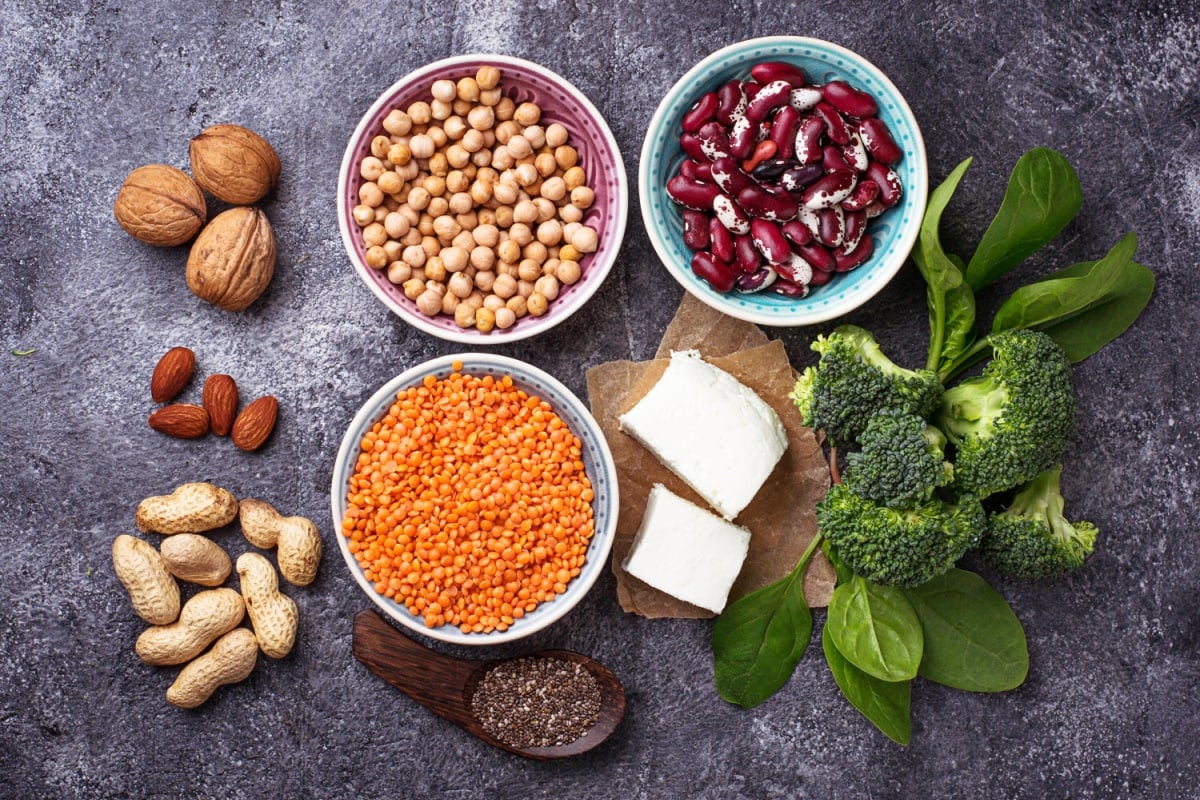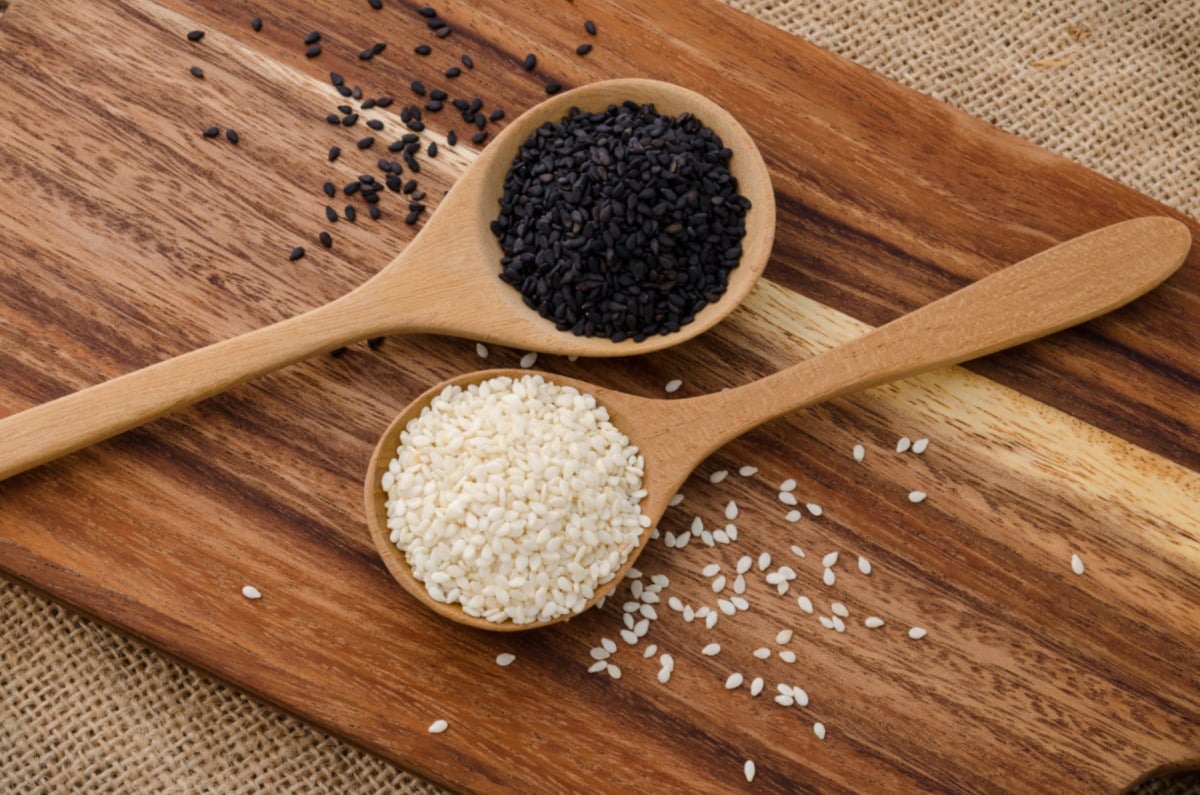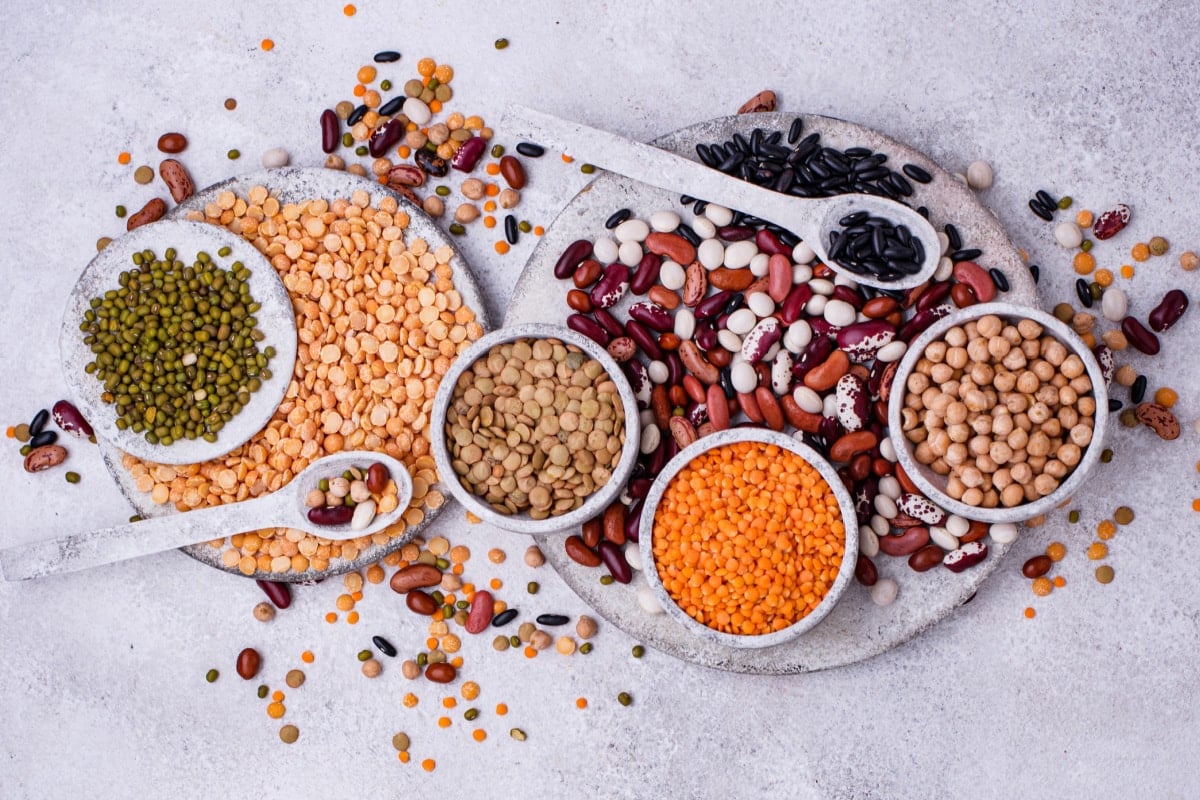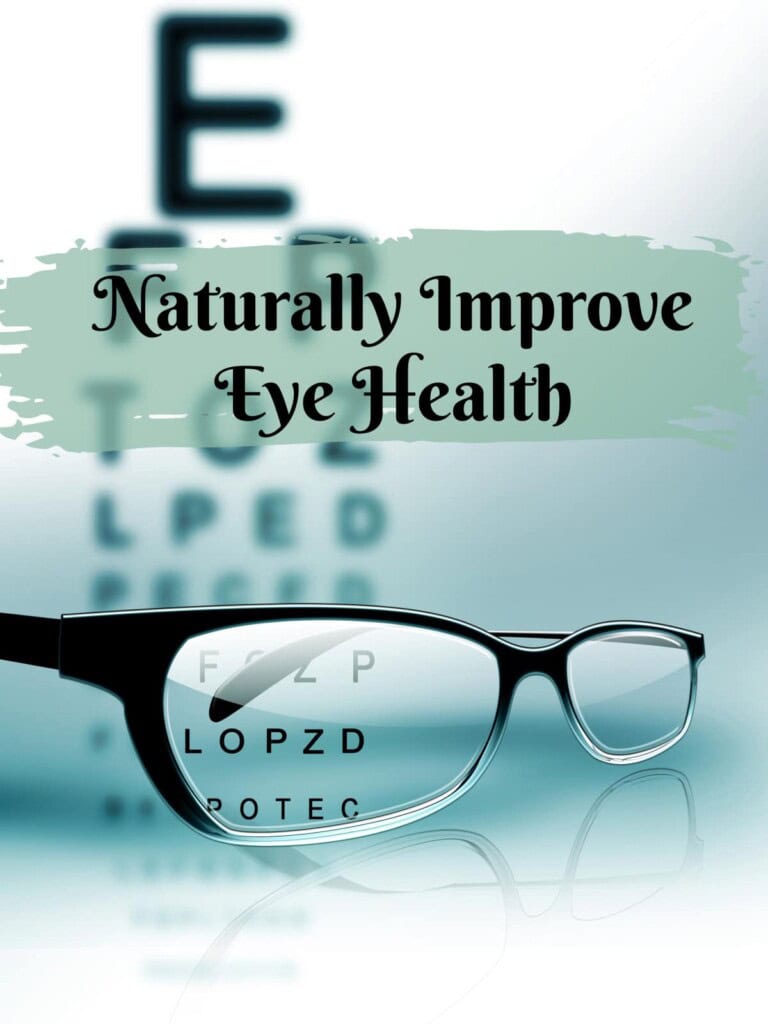6 Amazing Benefits of Lignans
The benefits of lignans are many, including supporting hormonal balance, increasing antioxidant protection, and enhancing cardiovascular health, among others.
In our article today, we’ll be delving deeper into what exactly lignans are, the benefits of lignans, food sources, and whether or not you should consider supplements.
See also 12 Foods That Kill Cancer Cells and Top 9 Foods High in Phytoestrogens.
What Are Lignans?
Lignans are a diverse group of natural compounds belonging to the polyphenol family.
They are widely found in plants, particularly in seeds, nuts, whole grains, and legumes.
One of the unique characteristics of lignans is their chemical structure, which consists of two phenylpropane units linked together. This configuration enables lignans to exhibit various biological activities in the human body.
Another notable feature of lignans is their ability to act as phytoestrogens. Phytoestrogens are plant-based compounds that can mimic or modulate the effects of estrogen, a hormone present in both males and females but more prevalent in females.
This property has attracted considerable interest regarding hormone-related conditions such as menopause symptoms, hormonal imbalances, and certain types of cancer.
In terms of health benefits, lignans have been studied for their potential role in reducing the risk of chronic diseases such as cardiovascular disease and certain types of cancer (including breast and prostate cancers) and promoting overall longevity.
They also possess anti-inflammatory properties that can help protect against inflammation-related conditions like arthritis and inflammatory bowel disease.
The Health Benefits of Lignans:
For these reasons, these phytochemical compounds have gained significant attention in recent years, which is worth looking into.
1. Anti-inflammatory effects
Chronic inflammation is at the root of many diseases, including arthritis, diabetes, obesity, and certain types of cancer.
Lignans exhibit anti-inflammatory actions by modulating inflammatory markers in the body.
By reducing inflammation, lignans may help alleviate symptoms associated with inflammatory conditions and contribute to overall health.
2. Hormonal balance
Lignans are known to exhibit phytoestrogenic properties, meaning they can mimic the effects of estrogen in the body.
This ability makes them beneficial for hormonal balance, especially in women during menopause or those suffering from conditions like polycystic ovary syndrome (PCOS).
Lignans exhibit both weak estrogenic (estrogen-like) and anti-estrogenic (blocks or reduces estrogen activity) effects within the body.
By mimicking the actions of estrogen when levels are low or binding to excess estrogens when levels are high, lignans help maintain hormonal harmony. This may alleviate symptoms like hot flashes, mood swings, and menstrual irregularities.
Lignans can also promote estrogen metabolism through their ability to inhibit aromatase enzyme activity.
Aromatase converts testosterone into estradiol (a potent form of estrogen) in different tissues throughout the body.
By inhibiting this enzyme’s activity, lignans help reduce excess estradiol production and maintain a better balance between estrogens.
Moreover, lignans promote healthy detoxification processes within the liver by enhancing phase II liver detoxification enzymes that aid in metabolizing hormones like estrogen for elimination from the body.
This helps prevent excessive accumulation of estrogens that could otherwise disrupt hormonal balance.
3. Heart health
Lignans can promote heart health in various ways, including:
Lowering blood pressure:
Hypertension or high blood pressure is a significant risk factor for heart disease.
Studies suggest that consuming lignan-rich foods may help regulate blood pressure levels due to their ability to relax blood vessels and improve endothelial function – vital aspects for maintaining optimal cardiovascular health.
Flax seed lignans, for example, have been shown to reduce renal angiotensin-II, which can constrict blood vessels leading to high blood pressure.
In one study, flax lignans were also shown to increase nitric oxide, which causes dilatation and relaxation of blood vessels, thus leading to a drop n blood pressure.
Lowering cholesterol:
Cholesterol is an essential waxy, fat-like substance that the body needs to function properly, but too much of it can be harmful.
The commonly known effect of too much cholesterol is its plaque-forming effects within the blood vessels.
Plaque is a thick, hard deposit that can narrow the arteries and make them less flexible. With time, this can lead to atherosclerosis or hardening of arteries, which is a risk factor for cardiovascular issues like stroke and heart attack,
Research indicates that lignans may positively impact lipid profiles by lowering LDL (bad) cholesterol levels while boosting HDL (good) cholesterol levels.
One study even found that when taken consistently, lignans can lower cholesterol by 20%.
Antioxidant protection:
Oxidative stress plays a crucial role in the development of cardiovascular diseases. Fortunately, lignans act as powerful antioxidants by neutralizing harmful free radicals within the body’s cells and tissues.
By countering oxidative damage, these compounds can protect against cell damage that can contribute to heart-related ailments.
Anti-inflammatory effects:
Inflammation is an underlying factor in heart disease, contributing to the formation of arterial plaques and blood clotting.
Lignans have been found to possess anti-inflammatory properties, inhibiting the production of inflammatory molecules.
This action helps maintain healthy blood vessels and reduces the risk of cardiovascular conditions.
4. Lignans can help prevent cancer
Cancer, a devastating disease affecting millions worldwide, continues to be a major health concern.
While advancements in medical science have improved treatment options, prevention remains an essential approach towards combating cancer.
In recent years, lignans have emerged as potential agents that can contribute significantly to cancer prevention.
For one, Lignans possess potent antioxidant properties that help protect cells from oxidative stress caused by free radicals. This action helps reduce DNA damage and prevents mutations that may lead to the development of cancerous cells.
Another significant benefit of lignans in fighting cancer is their ability to balance hormone levels within the body.
Certain types of cancers (e.g., breast and prostate) are hormone-dependent. Lignans can act as weak estrogen-like substances or anti-estrogens by binding to estrogen receptors within cells.
By doing so, they can modulate hormonal balance and prevent excessive estrogen stimulation associated with tumor growth. This is one of the greatest Benefits of incorporating Lignan sources in your diet.
5. Enhances digestive health
One of the key ways lignans enhance digestive health is by promoting regular bowel movements.
Lignans act as dietary fibers that add bulk to the stool and facilitate its movement through the intestines.
This helps prevent constipation and supports regular bowels.
Lignans also play a crucial role in maintaining a healthy balance of gut bacteria or microbiota. They serve as prebiotics – substances that feed and stimulate the growth and activity of beneficial bacteria in the gut.
By nourishing these good bacteria, lignans contribute to optimal digestion and absorption of nutrients from food.
Additionally, lignans possess anti-inflammatory properties that can help reduce inflammation in the gut lining and alleviate symptoms associated with these conditions.
Moreover, lignans possess antimicrobial properties that can help combat harmful bacteria, fungi, and parasites in the gut.
By inhibiting the growth of these microorganisms, lignans contribute to a healthier digestive environment and reduce the risk of gastrointestinal infections.
6. Skin health
Lignans possess potent anti-aging properties due to their ability to scavenge free radicals and reduce oxidative stress.
Free radicals can cause damage to cells, leading to premature signs of aging such as wrinkles, fine lines, and sagging skin.
By neutralizing these harmful molecules, lignans help maintain youthful-looking skin.
In addition, their ability to fight inflammation helps soothe common skin conditions such as acne, eczema, and psoriasis.
Moreover, their ability to maintain normal hormonal balance is crucial for alleviating hormonal skin issues like hormonal acne.
Natural Sources of Lignans:
1. Flaxseeds
Flaxseeds are one of the richest sources of lignans. These tiny seeds contain high amounts of a specific type called secoisolariciresinol diglucoside (SDG) lignans.
Incorporating ground flaxseeds into your meals or adding them to smoothies, oatmeal, or baked goods can be an easy way to boost your lignan intake.
2. Sesame Seeds
Sesame seeds also provide a notable amount of lignans, specifically sesamin and sesamolin.
These seeds can be sprinkled on top of salads, stir-fries, or added to homemade granola bars for a crunchy texture and nutty flavor while increasing your lignan intake.
3. Whole Grains
Several whole grains, such as oats, barley, rye, and wheat bran, contain a good amount of lignans. Opting for whole-grain bread instead of refined white bread or incorporating these grains into soups and stews can help increase the lignan content in your meals.
3. Cruciferous Vegetables
Vegetables like broccoli, cabbage, Brussels sprouts, and kale provide not only essential vitamins and minerals but also contain significant amounts of lignans such as enterodiol and enterolactone.
Including these vegetables in your daily diet is not only beneficial for overall health but also helps increase your lignan consumption.
4. Berries
Berries like strawberries, raspberries, and cranberries are small fruits packed with antioxidants and can also contribute to dietary lignan intake due to their secoisolariciresinol content.
Including a variety of berries in your diet can provide both lignans and other essential nutrients.
5. Legumes
Legumes, including lentils, chickpeas, and kidney beans, are excellent plant-based protein sources that also contain measurable amounts of lignans.
Adding legumes to salads, soups, or preparing plant-based dishes with them can contribute to your daily lignan intake while
Can You Take A Lignan Supplement?
While it’s ideal to obtain nutrients from whole foods rather than supplements whenever possible, some individuals might benefit from a lignan supplement for additional support.
With that being said, it’s crucial to consult a healthcare professional before adding any new supplement to your routine.
Also, remember that lignans are widely available in plant-based foods such as flaxseeds, sesame seeds, whole grains, legumes, and fruits.
So including these foods in your diet can naturally boost your lignan intake without relying solely on supplements.
How Much Lignan Should You Take?
If you’re considering taking a supplement, you could be asking how much lignin supplement you should take. And while you may expect a specific value, intake may vary depending on various factors, including:
1. Health condition:
The recommended dose of lignan supplements may vary depending on individual health conditions or goals.
For instance, those with hormone-related issues like menopause symptoms might require a higher dosage than others.
2. Age and gender:
Age and gender can also play a role in determining the optimal lignan supplement dosage. For example, postmenopausal women often require a higher dose due to decreased estrogen levels.
3. Overall diet:
Assessing your intake of lignans from natural food sources is crucial before deciding on a supplement dosage.
If you already consume substantial amounts of lignans through your regular meals, lower doses may suffice. Making this assessment will lower the risk of side effects that could occur while trying to reap benefits of Lignans.
General Guidelines:
While it’s best to consult with a healthcare professional regarding personalized advice for taking any new supplements, here are some general guidelines:
1. Start low and gradually increase:
Begin by taking the lowest recommended daily dose indicated on the product label or as advised by your healthcare provider. Slowly increase the dosage if necessary while closely monitoring any changes in your body’s response.
2. Consider standardized extracts
: Look for standardized extracts when selecting a supplement brand, as these products typically mention their specific concentration of active ingredients (in this case, lignans). This information allows better control over dosing.
3. Follow product instructions:
Always follow the manufacturer’s instructions regarding dosage and frequency. These recommendations are typically based on clinical research and have been tested for safety.
4. Monitor effects & consult a professional:
Pay attention to any changes in your body or overall well-being while taking lignan supplements. If you experience any adverse effects or have concerns, it is crucial to seek guidance from a healthcare professional.
Risks and side effects of consuming too much lignans
While lignans are beneficial, consuming excessive amounts can pose certain risks and side effects that individuals should be aware of.
1. Hormonal disruption:
One significant risk of consuming too much lignans is hormonal disruption. Lignans contain phytoestrogens, which are plant compounds that mimic estrogen hormone in the body.
2. Gastrointestinal distress:
Excessive consumption of lignan-rich foods could lead to gastrointestinal distress such as bloating, gas formation, abdominal cramps, or discomfort due to their high fiber content.
Individuals who already struggle with digestive issues like irritable bowel syndrome (IBS) should exercise caution when consuming large amounts of these foods.
3. Nutrient absorption interference:
Lignans possess binding properties that can hinder the absorption of essential nutrients like iron and calcium from consumed food sources when consumed excessively over a prolonged period.
This interference may lead to nutritional deficiencies if not managed properly through balanced dietary choices.
4. Impact on medication:
Lignans can interact with certain medications, including hormone replacement therapies and birth control pills.
Excessive consumption of lignan-rich foods might affect the effectiveness or increase the side effects of these medications.
So, it’s crucial to consult a healthcare professional before significantly altering your dietary habits if you are taking any prescribed medication.
Related Articles:
Final Thoughts
Lignans have demonstrated a wide range of potential health benefits. From their powerful antioxidant properties to their hormone-balancing effects and potential cancer-fighting abilities, lignans offer great promise in supporting overall health and well-being.
Incorporating lignan-rich foods such as flaxseeds, sesame seeds, whole grains, fruits, and vegetables into our diets can provide us with an excellent source of these beneficial compounds.
Furthermore, with emerging research suggesting their role in cognitive function and bone health, lignans are indeed versatile phytonutrients worth incorporating into your daily lives. Start now to take advantage of the benefits of lignans.
If you enjoyed this post about 6 Amazing Benefits of Lignans and would love to see more, join me on Youtube, Instagram, Facebook & Twitter!
Get discounted copies of my cookbook here.
Fortunately, because of the ads on our website, readers and subscribers of Healthier Steps are sponsoring many underprivileged families. Thank you!
Also, please leave a star rating! ;-)













